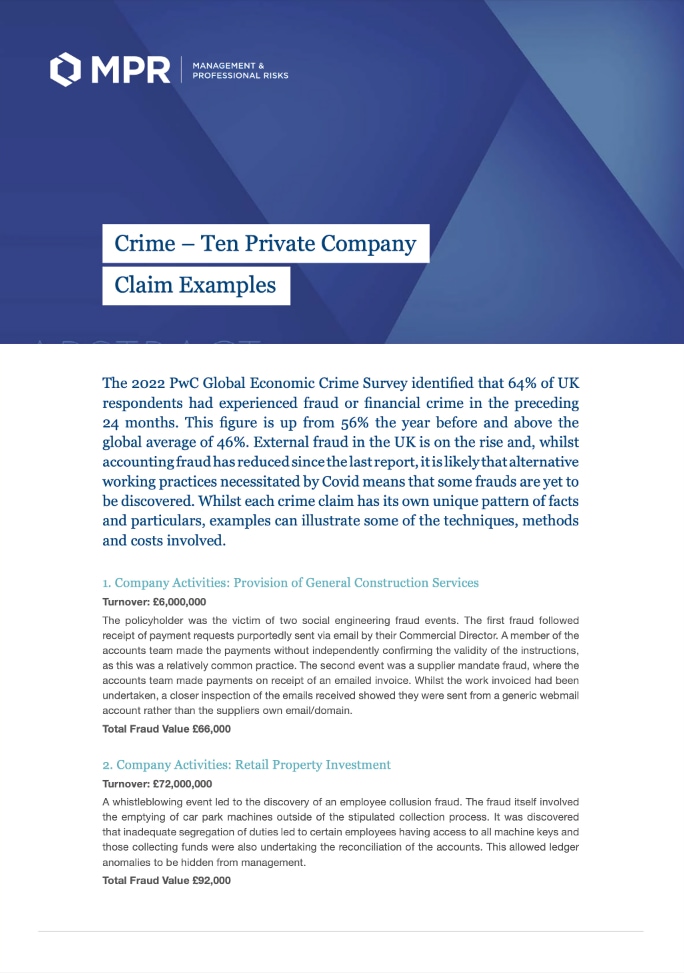The 2022 PwC Global Economic Crime Survey identified that 64% of UK respondents had experienced fraud or financial crime in the preceding 24 months. This figure is up from 56% the year before and above the global average of 46%. External fraud in the UK is on the rise and, whilst accounting fraud has reduced since the last report, it is likely that alternative working practices necessitated by Covid means that some frauds are yet to be discovered. Whilst each crime claim has its own unique pattern of facts and particulars, examples can illustrate some of the techniques, methods and costs involved.
1. Company Activities: Provision of General Construction Services
Turnover: £6,000,000
The policyholder was the victim of two social engineering fraud events. The first fraud followed receipt of payment requests purportedly sent via email by their Commercial Director. A member of the accounts team made the payments without independently confirming the validity of the instructions, as this was a relatively common practice. The second event was a supplier mandate fraud, where the accounts team made payments on receipt of an emailed invoice. Whilst the work invoiced had been undertaken, a closer inspection of the emails received showed they were sent from a generic webmail account rather than the suppliers own email/domain.
Total Fraud Value £66,000
2. Company Activities: Retail Property Investment
Turnover: £72,000,000
A whistleblowing event led to the discovery of an employee collusion fraud. The fraud itself involved the emptying of car park machines outside of the stipulated collection process. It was discovered that inadequate segregation of duties led to certain employees having access to all machine keys and those collecting funds were also undertaking the reconciliation of the accounts. This allowed ledger anomalies to be hidden from management.
Total Fraud Value £92,000
3. Company Activities: Restaurant Operator
Turnover: £50,000,000
A genuine email chain with a supplier arranging payment of an outstanding invoice was intercepted by a third party who amended the supplier account details to their own. As the policyholder was unaware that the change had been made they made the payment in good faith to what they believed to be the suppliers account.
Total Fraud Value £130,000
4. Company Activities: Air Conditioning Contractor
Turnover: £10,000,000
A long serving employee in the accounts department was discovered to have been diverting policyholder funds to their own bank account using fake invoices they had created to reconcile the payments against. The fraud was perpetrated over a 5 year period with just under one hundred fraudulent transactions made.
Total Fraud Value £400,000
5. Company Activities: Industrial Contractors
Turnover: £16,000,000
The email account of an employee was hacked and monitored for purchase orders. When the hacker saw that a legitimate order for new machinery was being made they created a spoof email address and commenced correspondence with the employee regarding the purchase. As the hacker had access to the account of the employee, they were able to convince the employee they were the legitimate supplier and the payment for the machinery was made to the wrong party.
Total Fraud Value £50,000
6. Company Activities: Drinks Bottler and Distributor
Turnover: £20,000,000
Following an external audit, a company director was discovered to have been making recurring fraudulent payments to both employees and third parties who had colluded with the director over a seven year period. The seniority of the director, together with the length of time the payments had been made to the same recipients meant that the accounting team failed to question or interrogate the fraudulent fund transfer requests.
Total Fraud Value: £1,200,000
7. Company Activities: Civil Engineer
Turnover: £35,000,000
A contract required the procurement of portable buildings for use on site. An employee mentioned that a reputable supplier of these products had been advertising such buildings and passed details to the purchasing department. Introductions were made and an order was placed with payment made upfront. Only after making payment and whilst following up when the delivery did not take place, did the purchasing department discover that the correspondence and subsequent order were made with a third party who was using a spoof email address.
Total Fraud Value: £150,000
8. Company Activities: Audio Equipment Manufacturer
Turnover: £10,000,000
A director falsified an order for a bulk purchase of products to improve sales figures, which in turn would increase their performance bonus. As the order was fake, payment for the order was never received from the customer, leaving the insured with a significant stock of products that were highly specialised and of no use to any other customer. This left the company with a significant loss due to the valueless product.
Total Fraud Value £900,000
9. Company Activities: Pet Food Wholesaler
Turnover £15,000,000
Three employees colluded to falsify stock levels at one of the warehouse locations belonging to the policyholder. The location manager, along with two supervisors, manipulated figures within the stock management software, allowing them to remove stock from the warehouse and sell it privately. The fraud was only discovered when a head office inventory review that was undertaken at the location revealed significant stock discrepancies.
Total Fraud Value: £200,000
10. Company Activities: Design and Manufacture of Clothing
Turnover: £9,000,000
A new Finance Director was appointed. Following the appointment, the incumbent Finance Team Manager was found to have defrauded his employer over a four year period. The fraud consisted of multiple methods of misappropriation of company funds, including the creation of fake invoices, changing payee account details in the online banking system to his own and using the company credit card to make personal purchases whilst amending the statements to hide the payments. The employee initially admitted to misappropriation of funds to the value of £70,000. The final loss was discovered to be significantly greater.
Total Fraud Value £1.3m

